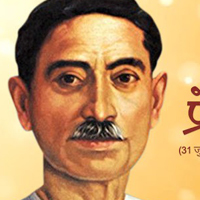Premchand
Dhanpat Rai Srivastava, better known by his pen name Munshi Premchand, was an Indian writer famous for his modern Hindustani literature. He is one of the most celebrated writers of the Indian subcontinent, and is regarded as one of the foremost Hindi writers of the early twentieth century.
Premchand, also spelled Prem Chand, pseudonym of Dhanpat Rai Srivastava, was an Indian author of novels and short stories in Hindi and Urdu who pioneered in adapting Indian themes to Western literary styles.
Premchand worked as a teacher until 1921, when he joined Mohandas K. Gandhi’s Noncooperation Movement. As a writer, he first gained renown for his Urdu-language novels and short stories. Except in Bengal, the short story had not been an accepted literary form in northern India until Premchand’s works appeared. Though best known for his works in Hindi, Premchand did not achieve complete fluency in that language until his middle years. His first major Hindi novel, Sevasadana, dealt with the problems of prostitution and moral corruption among the Indian middle class. Premchand’s works depict the social evils of arranged marriages, the abuses of the British bureaucracy, and exploitation of the rural peasantry by moneylenders and officials.
Much of Premchand’s best work is to be found among his 250 or so short stories, collected in Hindi under the title Manasarovar (“The Holy Lake”). Compact in form and style, they draw, as do his novels, on a notably wide range of northern Indian life for their subject matter. Usually they point up a moral or reveal a single psychological truth.
Premchand’s novels include: Premashram , Rangabhumi , Ghaban , Karmabhumi , and Godan .

Premchand
Date of Birth: 31 Jul 1880
Birth Place: Lamhi, Varanasi
Proffession: Indian writer
Nationality: Indian


